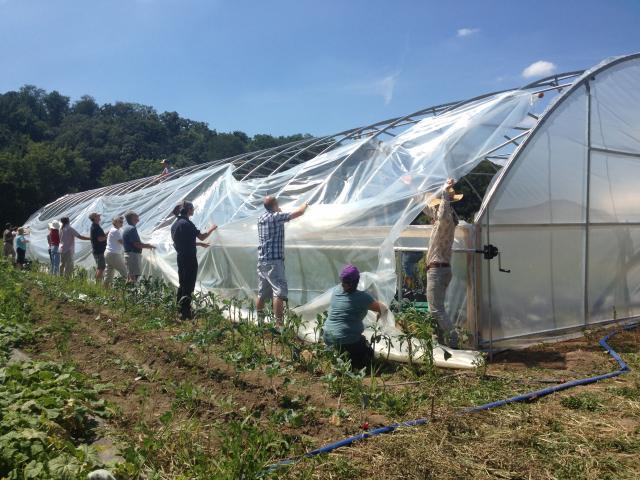







Driving down the narrow country road, with clouds of thick dust rising over the windshield, 2299 Spring Rose Rd. can be difficult to spot for newcomers. But on the weekend of Aug. 16-18, the area was crowded with visitors from the community curious about the programs and work that “crops up” at the Linda and Gene Farley Center for Peace, Justice and Sustainability.
The weekend was filled with a series of educational and entertaining events, open to all members of the community, to celebrate the legal transfer of land from the Farley family to the Farley Center and to honor the work of significant individuals who have contributed to the center. Events included a feast prepared with ingredients grown on Farley land, a dedication ceremony, and an open house where guests had the opportunity to tour the property and help construct a low-cost hoop house.
The Farley Center and all of its programs are dedicated to preserving the environment and promoting sustainability. The center provides a space for workshops with the goal of spreading the message of sustainability throughout the community. Also, 10 acres of Farley land support nine farm businesses and help them “to overcome barriers such as language and lack of capital to invest in land,” according to Farley Center Associate Project Director Mrill Ingram
One of the significant support aspects for these farmers is the hoop house, which is composed of multiple metal support arches and a special plastic material. The hoop house is important to farmers who cultivate on the Farley Center’s land because it extends the growing season. It is similar to a greenhouse, except that a hoop house conducts heat naturally, according to Greg Allen. Since the house maintains a temperature of 60 degrees during the cold months, farmers can plant seedlings as soon as March and grow hardier crops, like spinach, until late December, said Allen.
Constructing a low-cost hoop house is part of the education and equipment provided in the Farley Center farm incubator program.
A farm incubator is different for every farm, but in general it is “a place where aspiring farmers have access to land, equipment and training that allows them to pursue their interest in farming,” according Ingram.
Ingram has an extensive past working with environmental and agricultural groups, but when she joined the Farley Center staff in January of 2013, Ingram found a new interest in working with immigrant farmers and other diverse farming groups.
“It’s an important connection to try to foster ... to try and support other groups in farming,” said Ingram.
The Farley Center has built a diverse multicultural farming community through outreach programs and language services. The different ethnic communities represented by growers include, but are not limited to Hmong, Mexican and Euro-American men and women.
Many of the farmers produce specialty crops from their cultural backgrounds like lemongrass, whole wheat basil, Mexican squash, papalo and epazote. All nine businesses use organic growing techniques, and the Farley Center is working to assist each business in achieving organic certification.
While many farmers practiced organic growing from the start, some farmers have more experience than others because they come from cultures that lived off the land, according to Allen.
The farm businesses who cultivate on the Farley Center’s land sell their produce to the community through farmer’s markets and CSAs, as well as to local restaurants, schools and institutions.
In addition to hosting workshops, outreach programs and assisting with organic certification, the Farley Center runs a program called Land Link, which connects farmers with landowners to increase growing opportunities for new farmers, according to Ingram.
Another significant aspect of the Farley Center is the nature preserve cemetery called the Natural Path Sanctuary. This natural burial ground spreads over 25 acres and continues to promote the Farley Center mission of environmental sustainability and preservation. All burial materials are biodegradable, and the area is left to grow completely wild besides the natural burials. It is the first green cemetery in Dane County.
For more information on the Farley Center or any of the Center’s programs visit http://www.farleycenter.org/index.php/en/home.
|
|
|
Welcome to the Madison Commons, a website designed to provide news and information about all of Madison's neighborhoods and a crossroads for the discussion of community issues. The name comes from the idea of a village commons, a place for news, talk, debate, and some entertainment, too, that's open to everyone.
All rights reserved. Read more about the Madison Commons and its partners.

